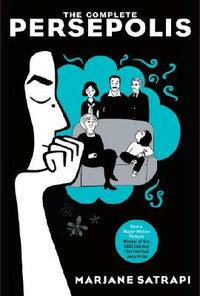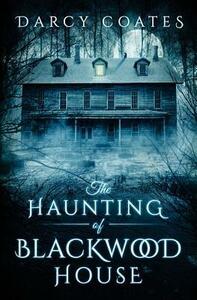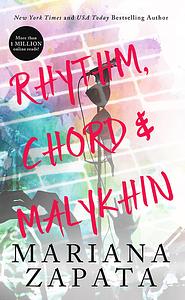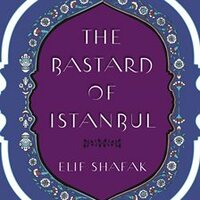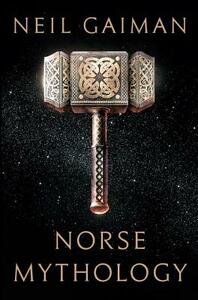You need to sign in or sign up before continuing.
Take a photo of a barcode or cover
whatsshwereading's Reviews (740)
This is the first book that I read as a part of my 2017 book project and I really, really liked it - from the story, to the art, to the self-deprecating humour, this was a fantastic read!
Read my review on my blog - http://two-read.blogspot.in/2017/04/persepolis.html
Read my review on my blog - http://two-read.blogspot.in/2017/04/persepolis.html
Why do the protagonists in horror films/books have to be obliviously dumb?
A 3.5 star reading.
Anand Neelakantan belongs to the Amish Tripathi, Ravi Subramanian club. In the sense that, these guys have terrific ideas but always fail to execute them. Their narratives suck. Perhaps because they try so very hard to emulate their western counterparts. Be that as it may, when my sister bought a copy of the Rise of Sivagami at the airport, I was torn - between the desire to read more about Mahishmati (I am a fangirl. Don't judge) and the scorn I felt (Asura was a disaster. A disaster)
But, of course I read it. And the 3.5 stars is solely for the premise and nothing else.
To begin with, the premise is quite intriguing. How did Sivagami Devi come to marry the villainous Bijjala Deva? Who was Amrendra Bahubali's father? What's Kattappa's story? I wanted all these answered and some more. Not that the book answers any. Yet. What it does is baits you. You have no other option but to wait for the next two instalments to get to where the flashback begins.
The other thing I liked about the book is its sheer Indianness. For a change, it was nice to read about Devadasis, Maharajas, Bhoomipathis, and Pattarayas. To see all those Indian names. The mentions of Gods and Goddesses. I suppose therein lies the book's USP. If you are a fan of all things Amar Chitra Katha, this book is bound to appeal, at least at the most basic level.
The good aside, what I didn't like about the book - the language. Short, stilted sentences annoy me, as do wannabe cussings (an issue with Tripathi's books as well). And then there were sub-plots to sub-plots, a pedophilic dwarf ('coz all dwarves HAVE to be evil according to GRR Martin), rebel groups, pirates, and some pointless characters. Phew! Too many sub-plots and characters killeth interest, dear author, please note. It makes it difficult to keep track and stay invested in a character.
The book (when it finally) ended, on a predictable cliffhanger. While I am keen to know what's in store for Mahishmathi, I doubt I'll be eagerly waiting for the second book in the trilogy. And when it comes, I hope Neelakantan does a better job of narrating Rajamouli's epic.
PS: I like movie Kattappa better than the young Kattappa in this book.
Anand Neelakantan belongs to the Amish Tripathi, Ravi Subramanian club. In the sense that, these guys have terrific ideas but always fail to execute them. Their narratives suck. Perhaps because they try so very hard to emulate their western counterparts. Be that as it may, when my sister bought a copy of the Rise of Sivagami at the airport, I was torn - between the desire to read more about Mahishmati (I am a fangirl. Don't judge) and the scorn I felt (Asura was a disaster. A disaster)
But, of course I read it. And the 3.5 stars is solely for the premise and nothing else.
To begin with, the premise is quite intriguing. How did Sivagami Devi come to marry the villainous Bijjala Deva? Who was Amrendra Bahubali's father? What's Kattappa's story? I wanted all these answered and some more. Not that the book answers any. Yet. What it does is baits you. You have no other option but to wait for the next two instalments to get to where the flashback begins.
The other thing I liked about the book is its sheer Indianness. For a change, it was nice to read about Devadasis, Maharajas, Bhoomipathis, and Pattarayas. To see all those Indian names. The mentions of Gods and Goddesses. I suppose therein lies the book's USP. If you are a fan of all things Amar Chitra Katha, this book is bound to appeal, at least at the most basic level.
The good aside, what I didn't like about the book - the language. Short, stilted sentences annoy me, as do wannabe cussings (an issue with Tripathi's books as well). And then there were sub-plots to sub-plots, a pedophilic dwarf ('coz all dwarves HAVE to be evil according to GRR Martin), rebel groups, pirates, and some pointless characters. Phew! Too many sub-plots and characters killeth interest, dear author, please note. It makes it difficult to keep track and stay invested in a character.
The book (when it finally) ended, on a predictable cliffhanger. While I am keen to know what's in store for Mahishmathi, I doubt I'll be eagerly waiting for the second book in the trilogy. And when it comes, I hope Neelakantan does a better job of narrating Rajamouli's epic.
PS: I like movie Kattappa better than the young Kattappa in this book.
It is difficult to not be affected by this beautifully written and sensitively narrated tale of diaspora, religion, and familial bonds. Elif Shafak's The Bastard of Istanbul is a melting pot of all that plagues those who are unable to let go of the past to live in the present and those benighted of the past and are struggling with their present.
The book's strength lies in its superbly built (developed) characters and of all the characters The Bastard of Istanbul features, Asya and Armanoush grab your attention. Asya is too young, too foolish, too intense, too furious to be contained and Armonoush too naive, too righteous, too impressionable to understand the world around her. They both (for most part of the book) grapple with identity crisis - Armanoush because of diaspora and Asya because she's a bastard. Separately, they appear mutually exhaustive, but together their personalities cancel out and they are two sides of a perfectly crafted coin.
In addition to Asya and Armanoush, the multitude of Aunties and exhaustive list of characters (mostly female), one person that fascinated me was Auntie Feride - an unpredictable, self-confessed paranoid hypochondriac. She oft provided the much needed comic relief by way of sudden, absurd and morbid statements.
The characters apart, the book succeeds in intertwining history with religion i.e the Turkish - Armenian conflict of 1915 and the resultant Armenian Holocaust. Now while I am not new to the concept of holocaust, it was surprising to read that races other than Jews experienced such a fate. Shafak doles out mercilessly, albeit in installments, the cruel sentence meted out to Armenian intelligentsia living in Istanbul, by the Ottoman rule and you cannot help but allow your heart to break. However, having said that, Shafak through the words of Baron Baghdassarian summarizes the entire conflict beautifully - "Just like the Turks have been in the habit of denying their wrongdoing, the Armenians have been in the habit of savoring the cocoon of victim-hood."
Then there are these slices of everyday life of Islamic women of Turkey - some adhering to age-old patriarchal customs in guise of theism and others rebelling against the very same norms, the description of the thriving city that is Istanbul, and food!!
Finally, it's the prose that neatly ties a bow to all the above listed pluses. Shafak displays literary mastery and you never feel, even once that you're reading a book written by a non-native speaker of English language. In fact, I've read some acclaimed American and Brit works that were utter rubbish. I've discovered an entire set of words that are now my favourites.
While the book has so much going for it, I must say, there are a few things that didn't work in its favour. For one, it seemed like Shafak couldn't decide if she wanted to write a tale of diaspora and how it affects a community or the trials & tribulations of women unwilling to be suppressed by societal norms and ended up writing about it all. This resulted in a predictable (yet horrific) twist and a hurried, unconvincing, abrupt ending. What happens to Asya? Is she finally free of the burden she carries on her young shoulders? Does Armanoush make peace with her past and resolve the conflict that rages inside her? I wish Shafak had at least written an epilogue to hint at what might have been happening in the lives of all these women.
These gripes aside, The Bastard of Istanbul, the third in my Around the World project is a wonderful read. I'd recommend you read it - to add more words to your dictionary, to learn more about Turkey, and most importantly, (at the risk of being struck by lightening) to know that Jews were not the only ones who suffered.
The book's strength lies in its superbly built (developed) characters and of all the characters The Bastard of Istanbul features, Asya and Armanoush grab your attention. Asya is too young, too foolish, too intense, too furious to be contained and Armonoush too naive, too righteous, too impressionable to understand the world around her. They both (for most part of the book) grapple with identity crisis - Armanoush because of diaspora and Asya because she's a bastard. Separately, they appear mutually exhaustive, but together their personalities cancel out and they are two sides of a perfectly crafted coin.
In addition to Asya and Armanoush, the multitude of Aunties and exhaustive list of characters (mostly female), one person that fascinated me was Auntie Feride - an unpredictable, self-confessed paranoid hypochondriac. She oft provided the much needed comic relief by way of sudden, absurd and morbid statements.
The characters apart, the book succeeds in intertwining history with religion i.e the Turkish - Armenian conflict of 1915 and the resultant Armenian Holocaust. Now while I am not new to the concept of holocaust, it was surprising to read that races other than Jews experienced such a fate. Shafak doles out mercilessly, albeit in installments, the cruel sentence meted out to Armenian intelligentsia living in Istanbul, by the Ottoman rule and you cannot help but allow your heart to break. However, having said that, Shafak through the words of Baron Baghdassarian summarizes the entire conflict beautifully - "Just like the Turks have been in the habit of denying their wrongdoing, the Armenians have been in the habit of savoring the cocoon of victim-hood."
Then there are these slices of everyday life of Islamic women of Turkey - some adhering to age-old patriarchal customs in guise of theism and others rebelling against the very same norms, the description of the thriving city that is Istanbul, and food!!
Finally, it's the prose that neatly ties a bow to all the above listed pluses. Shafak displays literary mastery and you never feel, even once that you're reading a book written by a non-native speaker of English language. In fact, I've read some acclaimed American and Brit works that were utter rubbish. I've discovered an entire set of words that are now my favourites.
While the book has so much going for it, I must say, there are a few things that didn't work in its favour. For one, it seemed like Shafak couldn't decide if she wanted to write a tale of diaspora and how it affects a community or the trials & tribulations of women unwilling to be suppressed by societal norms and ended up writing about it all. This resulted in a predictable (yet horrific) twist and a hurried, unconvincing, abrupt ending. What happens to Asya? Is she finally free of the burden she carries on her young shoulders? Does Armanoush make peace with her past and resolve the conflict that rages inside her? I wish Shafak had at least written an epilogue to hint at what might have been happening in the lives of all these women.
These gripes aside, The Bastard of Istanbul, the third in my Around the World project is a wonderful read. I'd recommend you read it - to add more words to your dictionary, to learn more about Turkey, and most importantly, (at the risk of being struck by lightening) to know that Jews were not the only ones who suffered.
I am an ardent Gaiman fan yet I do not know what to make of this book. It's weirdly gothic, the way Gaiman's books tend to be - starting out easy and ending on a dark, dark note.
As much as I love Gaiman's fantastical tales, I love tales of days gone by even more. Mythology in particular. Netflix's excellent Vikings introduced me to Norse mythology and I've been itching to get my hands on a book that told the tales. When I discovered that one of my favourite fantasy writers was writing about my latest favourite subject it was like all my fav holidays rolled into one.
But, **whispers** the book somehow didn't meet my expectations.
Maybe because I expected more. Maybe because it makes me ask questions for which it doesn't have any answers. Like, why did the Gods hate the giants so? Is it because they were ugly? Different? Very similar to Devas and Asuras.
Loki (whom Tom Hiddleston plays perfectly in the Americanised Asgard) is mischievious but not cruel or evil. Save one instance. But whatever made him go after Balder? Was it one of those prophecy things? Something irrational, but meant to happen anyway? Thor is dumb. Seriously, blonde dumb. Odin, the all-father arrogant in the way the most powerful tend to be. Freya is ALWAYS angry! The others not mentioned enough to create a lasting impression.
My questions and deep dislike of Norse Gods notwithstanding, the stories Gaiman chose to tell were fascinating. His writing, as always easy to read and not demanding too much effort. I'd certainly recommend this book for a lazy morning or evening read. Best enjoyed with a cup o' sweet tea!
As much as I love Gaiman's fantastical tales, I love tales of days gone by even more. Mythology in particular. Netflix's excellent Vikings introduced me to Norse mythology and I've been itching to get my hands on a book that told the tales. When I discovered that one of my favourite fantasy writers was writing about my latest favourite subject it was like all my fav holidays rolled into one.
But, **whispers** the book somehow didn't meet my expectations.
Maybe because I expected more. Maybe because it makes me ask questions for which it doesn't have any answers. Like, why did the Gods hate the giants so? Is it because they were ugly? Different? Very similar to Devas and Asuras.
Loki (whom Tom Hiddleston plays perfectly in the Americanised Asgard) is mischievious but not cruel or evil. Save one instance. But whatever made him go after Balder? Was it one of those prophecy things? Something irrational, but meant to happen anyway? Thor is dumb. Seriously, blonde dumb. Odin, the all-father arrogant in the way the most powerful tend to be. Freya is ALWAYS angry! The others not mentioned enough to create a lasting impression.
My questions and deep dislike of Norse Gods notwithstanding, the stories Gaiman chose to tell were fascinating. His writing, as always easy to read and not demanding too much effort. I'd certainly recommend this book for a lazy morning or evening read. Best enjoyed with a cup o' sweet tea!

